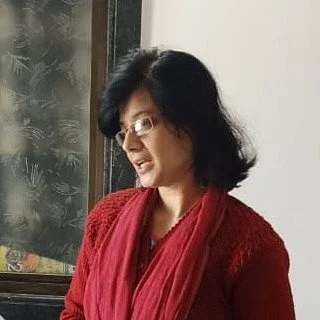Three Poems
by Pulkita Anand
Angst of Freud
ID, Ego, and superego, it’s enough, Mr Freud.
I tried and tried but couldn’t ride/read anything,
you monster. Shoo off, you monster, that
hangs upright and whispers from the hem in my ear that
I am near. Leave me. Leave me.
Otherwise, I will fry and dry you in a deep cauldron.
Yes. Yes, as deep as your subconscious,
you will not reach the surface of your consciousness.
I dream of a dream which I don’t remember
Do I need to? Yes, for psychoanalysis.
Enough, fuck it off. Hamlet’s problem,
Is not my problem.
Oedipus or Electra, I don’t care what’s
his child’s name. He is a very complex particle.
So, please don’t use an article before his name.
And mind you, tell him, whatshisname, Laka,
Paaka, I don’t consider him worth a dime.
Garden
Garden(v) to lay out and cultivate a garden.
So much depends on the WHITE wheelbarrow
And mower. To cut and keep. To keep and destroy
To move to remove. To cry for care. To collect to despair.
Cutting, chopping, mowing, removing, and pruning
the weeds, plants, flowers, and animals that are
deemed only useful. Songs, languages, wings,
Twigs and flowers are buried with time, covering their tombs.
Utilitarianism, Oops! Another “ism”
Like other isms, colonialism, racism, imperialism….
Organisation, symmetry. Method.
Though this be madness, there is a method of meanness in it.
Nature’s beauty is in the wilderness, some poets said,
“Wilderness preserved . . . is good for our spiritual health.”
Another said, “In Wildness is the preservation of the World,”
And yet another said, “To speak of wilderness is to speak of wholeness,”
All the great white poets are admirers of Nature in the wilderness.
Wild Nature, animals, birds, and plants. Once virginal innocent
Forests, then turned into a trimmed garden with the WHITE wheelbarrow,
Who is taming whom? Who is barbaric, and who is civilized?
That’s the question.
The garden looks beautiful without poppies, coleus, angel ambers,
bearded irises, daylilies, dahlias, columbines, and black roses.
The colour of grass is not of flowers; the colour of the root is not of branches.
Contrast creates confusion, creates life.
Mixing colour, collage-like, the wild Nature.
Children have learnt to play in the alley between the wild and the garden.
I slipped…
I slipped on my sleeping soul.
And spilt my head and heart.
Oh! Why so?
Death of days’ dropping desires
Fermenting grimace on the windowpane
What do you do?
I amuse myself by dribbling tears
Begging mercy around
rickety prudent lips.
Carrying sucking stony teats
of my heartbroken
misery.
I
Grasp the groaning city
And the moon and stars
Are compressed.
Hush!
And You?
Naked, lick the pavement
Of convulsed holocaust
How easy!
What do you hear?
War!
Enough!
Gauging gory blood
My obscene voice in a quagmire
Ringing rigmarole
What do you have?
My bloody soul
BIO: Pulkita Anand is an avid reader of poetry. She has translated one short story collection, “Tribal Tales from Jhabua”. Author of two children’s e-books, her eco-poetry collection is we were not born to be erased. Her creative works have been published in: Shortstory Kids, Twist and Twain, Tint Journal, Lapis Lazuli, The Creativity Webzine, Winc Magazine (Issue 1, 2, 5 &7), Stanza Cannon, Superpresent, Madwomen in the Attic, Poetica#11 &12, NCTE, The Uglywriters, Impspired (online &print issue) redsoethorns Journal (online) and magazine, Kritya, The Amazine, Carmina Magazine, Origami Press, Asiatic, Inanna Publication, Bronze Bird Books, New Verse News, Hakara Journal, Convergence anthology (selected), MAI and elsewhere.

